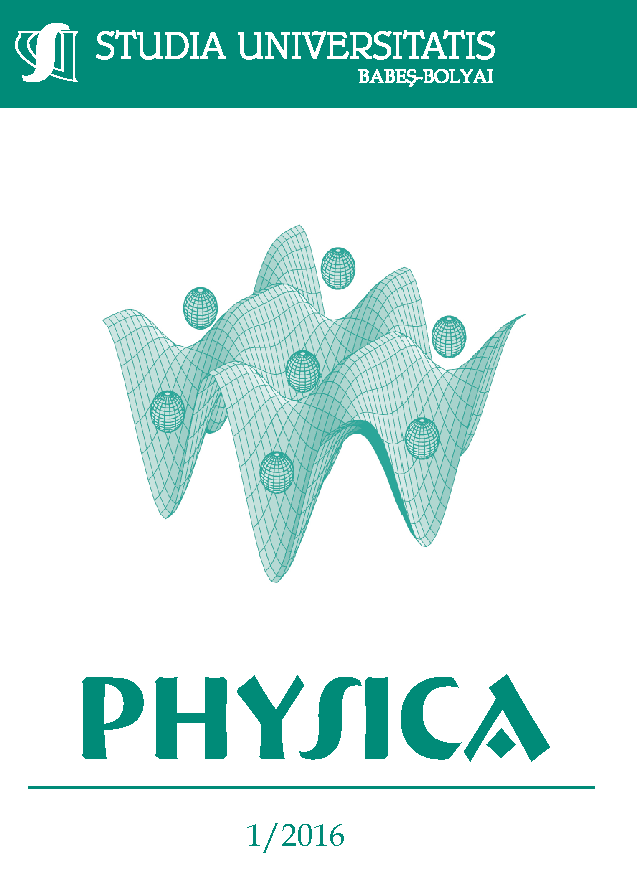UV-VIS PH DEPENDENCE OF DACARBAZINE: EXPERIMENTAL AND TD-DFT INVESTIGATIONS
Keywords:
dacarbazine, UV-Vis, pH, TD-DFT.Abstract
Dacarbazine (DTIC) is one of the most used chemotherapeutic drugs in the treatment of patients with metastatic malignant melanoma. Depending on the pH of the solution, different conformers or tautomers of the drug are expected to exist, eventually with different biological activities. In this study the UV-Vis absorption spectroscopy coupled with quantum chemical calculations were used to get new insights about the molecule’s structure and the pH influence on the absorption spectra of dacarbazine. The attention was focused on the possible conformers and tautomers of the molecule, on their stability and energetic order in gas-phase as well as in liquid state. Correlating the experimental UV-Vis data and Time dependent density functional theory (TD-DFT) computational results the conformers of DTIC, which are responsible for the absorption spectrum in water at different pH values, were identified. Subtle features of the absorption spectrum of DTIC were reliably explained using proper computational models and techniques. By using convergent approximations the experimental UV-Vis spectrum of dacarbazine was reproduced within the experimental errors. The changes that appear in the absorption spectra as a result of a pH change, have been attributed to the presence of protonated and deprotonated species of DTIC present in acidic and alkaline solutions, respectively.
References
A.M.M. Eggermont, J.M. Kirkwood, Re-evaluating the role of dacarbazine in metastatic melanoma: what have we learned in 30 years?, Eur. J. Cancer, 40 (2004) 1825–1836.
G.P. Warwick, The mechanism of action of alkylating agents, Cancer Res, 23 (1963), 1315-1333.
Balsamo A., Crotti P., Lapucci A., Macchia B., Macchia F., Del Tacca M., Mazzanti L., Ceserani R., Conformational effects on the activity of drugs. 7. Synthesis and pharmacological properties of 2-(p-nitrophenyl)-substituted morpholines, J. Med. Chem., 22 (1979), 738-41.
P. Saunders, W. DeChange, L. Chao, Mechanisms of 5-(3,3-dimethyl-1-triazeno)imidazole-4-carboxymaide (dacarbazine) cytotoxicity toward chinese hamster ovary cells in vitro are dictated by incubation conditions, Chem. Biol. Interactions, 58 (1986) 319–331.
H.C. Freeman and D. Hutchinson, The Crystal Structure of the Anti-Tumor Agent 5-(3,3-Dimethyl-l-triazenyl)imidazole-4-earboxamide (NSC-45388), Acta Cryst., B35 (1979), 2051-2054.
E. Torres, G.A. DiLabio, (Nearly) Universally Applicable Method for Modelling Noncovalent Interactions Using B3LYP, J. Phys. Chem. Lett., 3 (2012) 1738−1744.
B. Mennucci, J. Tomasi, R. Cammi, J.R. Cheeseman, M.J. Frisch, F.J. Devlin, S. Gabriel, P.J. Stephens, Polarizable Continuum Model (PCM) Calculations of Solvent Effects on Optical Rotations of Chiral Molecules, J. Phys. Chem. A, 106 (2002), 6102-6113.
Gaussian 09, Revision E.01, M.J. Frisch, G.W. Trucks, H.B. Schlegel, G.E. Scuseria, M.A. Robb, J.R. Cheeseman, G. Scalmani, V. Barone, B. Mennucci, G.A. Petersson, H. Nakatsuji, M. Caricato, X. Li, H.P. Hratchian, A.F. Izmaylov, J. Bloino, G. Zheng, J.L. Sonnenberg, M. Hada, M. Ehara, K. Toyota, R. Fukuda, J. Hasegawa, M. Ishida, T. Nakajima, Y. Honda, O. Kitao, H. Nakai, T. Vreven, J.A. Montgomery, Jr., J.E. Peralta, F. Ogliaro, M. Bearpark, J.J. Heyd, E. Brothers, K.N. Kudin, V.N. Staroverov, R. Kobayashi, J. Normand, K. Raghavachari, A. Rendell, J.C. Burant, S.S. Iyengar, J. Tomasi, M. Cossi, N. Rega, J.M. Millam, M. Klene, J.E. Knox, J.B. Cross, V. Bakken, C. Adamo, J. Jaramillo, R. Gomperts, R.E. Stratmann, O. Yazyev, A.J. Austin, R. Cammi, C. Pomelli, J.W. Ochterski, R.L. Martin, K. Morokuma, V.G. Zakrzewski, G.A. Voth, P. Salvador, J.J. Dannenberg, S. Dapprich, A.D. Daniels, Ö. Farkas, J.B. Foresman, J.V. Ortiz, J. Cioslowski, and D.J. Fox, Gaussian, Inc., Wallingford CT, 2009.
P.H. Willoughby, M.J. Jansma, T.R. Hoye, A guide to small-molecule structure assignment through computation of (¹H and ¹³C) NMR chemical shifts, Nature Protoc., 9 (2014) 643-660.
Downloads
Published
How to Cite
Issue
Section
License
Copyright (c) 2016 Studia Universitatis Babeș-Bolyai Physica

This work is licensed under a Creative Commons Attribution-NonCommercial-NoDerivatives 4.0 International License.






